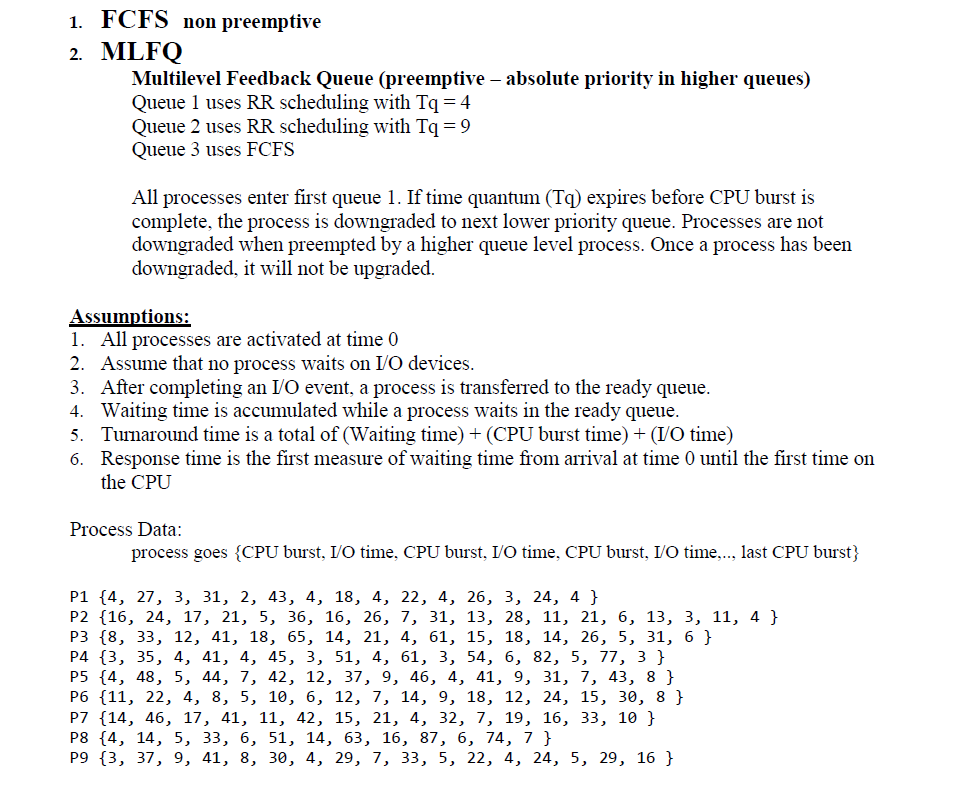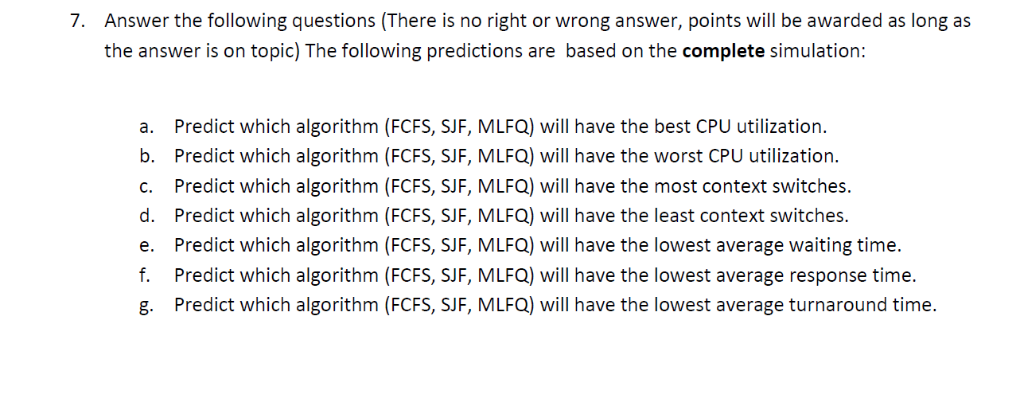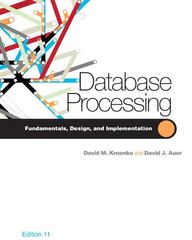

1. FCFS non preemptive 2. MLFQ Multilevel Feedback Queue (preemptive - absolute priority in higher queues) Queue 1 uses RR scheduling with Tq-4 Queue 2 uses RR scheduling with Tq-9 Queue 3 uses FCFS All processes enter first queue 1. If time quantum (Tg) expires before CPU burst is complete, the process is downgraded to next lower priority queue. Processes are not downgraded when preempted by a higher queue level process. Once a process has been downgraded, it will not be upgraded Assumptions: 1. All processes are activated at time 0 2. Assume that no process waits on devices 3. After completing an IO event, a process is transferred to the ready queue 4. Waiting time is accumulated while a process waits in the ready queue 5. Tumaround time is a total of (Waiting time) + (CPU burst time) (I/O time) 6. Response time is the first measure of waiting time from arival at time 0 until the first time on the CPU Process Data: process goes {CPU burst, L'O time, CPU burst, LO time, CPU burst, I/O time.., last CPU burst) P1 4, 27, 3, 31, 2, 43, 4, 18, 4, 22, 4, 26, 3, 24, 4 ) P2 116, 24, 17, 21, 5, 36, 16, 26, 7, 31, 13, 28, 11, 21, 6, 13, 3, 11, 4 ) P3 (8, 33, 12, 41, 18, 65, 14, 21, 4, 61, 15, 18, 14, 26, 5, 31, 6 P4 3, 35, 4, 41, 4, 45, 3, 51, 4, 61, 3, 54, 6, 82, 5, 77, 3 ) P5 {4, 48, 5, 44, 7, 42, 12, 37, 9, 46, 4, 41, 9, 31, 7, 43, 8 } P6 (11, 22, 4, 8, 5, 10, 6, 12, 7, 14, 9, 18, 12, 24, 15, 30, 8 ) P7 (14, 46, 17, 41, 11, 42, 15, 21, 4, 32, 7, 19, 16, 33, 10 P8 {4, 14, 5, 33, 6, 51, 14, 63, 16, 87, 6, 74, 7> P9 3, 37, 9, 41, 8, 30, 4, 29, 7, 33, 5, 22, 4, 24, 5, 29, 16 > 7. Answer the following questions (There is no right or wrong answer, points will be awarded as long as the answer is on topic) The following predictions are based on the complete simulation a. b. c. d. e. f. g. Predict which algorithm (FCFS, SJF, MLFQ) will have the best CPU utilization. Predict which algorithm (FCFS, SJF, MLFQ) will have the worst CPU utilization Predict which algorithm (FCFS, SJF, MLFQ) will have the most context switches Predict which algorithm (FCFS, SJF, MLFQ) will have the least context switches. Predict which algorithm (FCFS, SJF, MLFQ) will have the lowest average waiting time Predict which algorithm (FCFS, SJF, MLFQ) will have the lowest average response time. Predict which algorithm (FCFS, SJF, MLFa) will have the lowest average turnaround time








